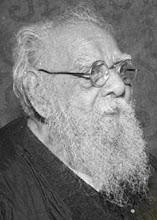The scene is inside a prison and there is a cultural show going on and there is a song and dance show by one particular prisoner. This guy is on a death sentence. He should recollect and relive the events of his life, his first love, the death of his father mutilated and killed in a caste skirmish and other events of his life. Though he is afraid of death, he tries to put on a brave face. The song should start on a brave note and then move into pathos with the guy ending up crying about his fate in the process, showcasing his attachment to his "paRai". paRai('pa' pronounced as in Param and 'ai' pronounced as 'I') is one of the many percussion instruments indigenous to Tamil Nadu. It is generally played by a certain section of people who have for ages been illtreated. The paRai in this context represents a lof of things. Most importantly it represents something essentially Tamil, something which is a symbol of the freedom and uniqueness of the Tamil.
If the director had told me this situation and had there been even one of the Grimm brothers around, we would have got a story called "Blinking Beauty". But the director being smarter gave it to Vairamuthu and we got a Black Beauty in "Putham Puthu Pattuedutha Thandavakone". The song starts with the quintessential and beautiful Indian way of saluting everyone right from the audience, to the traditions, to the hovering moon and most importantly to the dead beast whose skin was used in making the paRai. Vairamuthu dazzles throughout the song. Any thing might remind us of the past. The character here being a paRai player sees his past through the window of songs.
"pattu ennum jannal vazhi thandavakone,
en pazhaya kaalam theriyuthada thandavakone"So simple but yet so profound.
Such songs can turn out to be brilliant or plain dud depending on who the singer is. Generally for such songs the directors straight away ask for SPB. This song is however sung by Pushapavanam Kuppusamy. And rightly so. Kupps brings the necessary rustic feel to this song. And Kupps also comfortably scales the upper octaves. This is probably his best number in Tamil.
Now here comes the important issue... I read somewhere that Vidhyasagar first suggested that this song be sung by (hold your breath) Udit Narayan and Thankar Bachan(the director) seems to have even considered it for sometime. But when Udit Narayan could not get the pronounciation right(what is new about that?) they asked Kupps to do it. If this news is true, this is something similar to asking Loose Mohan to first act as VeeraPandiya Kaatabomman and then after realising that he is too thin for the role asking Sivaji to do it.
"Irruko illayo theriayathu, oruvela iruntha" Aandava, save Tamil from Udit Narayan and the rest of the world from America.

